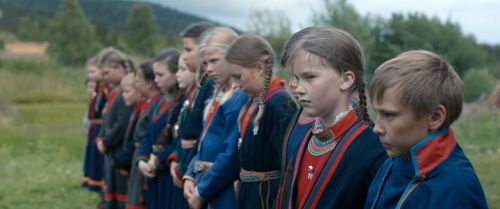Cinema | March 14th, 2018
 A captivating lead performance by Lene Cecilia Sparrok anchors the stout and handsome “Sami Blood,” winner of the award for Best Narrative Feature at the 2018 Fargo Film Festival.
A captivating lead performance by Lene Cecilia Sparrok anchors the stout and handsome “Sami Blood,” winner of the award for Best Narrative Feature at the 2018 Fargo Film Festival.
Set principally in the 1930s, director Amanda Kernell’s inaugural feature film identifies fiercely and intimately with Sparrok’s teenage Elle-Marja, who plots to leave her family and way of life for a different future in the city.
A member of the indigenous Scandinavian people known as the Sami, Elle-Marja has grown up participating in the semi-nomadic reindeer herding traditionally identified as one of the main livelihoods of the group.
“Sami Blood” debuted at the 2016 Venice Film Festival, earning a pair of key awards before moving through additional festival successes.
Interestingly, the near present-day sections of the film that offer a framing device tracking the now almost 80-year-old Elle-Marja (the older version of the character is played by Maj-Doris Rimpi) are incorporated into the feature directly from Kernell’s short “Stoerre Vaerie” -- known in English as “Northern Great Mountains” -- which showed at the 2015 Sundance Film Festival.
The Sami people have faced institutionalized racism and government-supported discrimination for centuries, a reality that Kernell makes crystal clear in both the contemporary and period eras she depicts.
Additionally, the director’s decision to shoot on location constructs a layer of documentary-like realism. The audience accompanies Elle-Marja in both the rural and semi-urban places she visits, and Kernell is especially good at communicating tiny details of emotional identification. The proximity to animals and the joy of a bracing and cleansing dip contrast sharply with the adrenalized fear lit up by a group of bullies. The awful result of the encounter with the latter functions for the remainder of the story as a symbolic marker of Elle-Marja’s permanent link to her culture.
Kernell’s own heritage -- her father is Sami and her mother is “traditional” Swedish -- illuminates the movie in significant measure. The filmmaker insisted on casting a pair of real sisters fluent in South Sami, a language estimated to be spoken by fewer than 500 people, and that commitment pays off in the stunning verisimilitude crafted by Kernell and her collaborators.
The most memorable sections of “Sami Blood,” including one painful reconstruction of the grotesque physical examinations forced on schoolchildren to drum up state “evidence” of Sami inferiority, directly and unflinchingly confront the horrors and humiliations -- large and small -- perpetrated against Elle-Marja.
As our protagonist navigates the impossible realities outside the life she feels is suffocating her, the brilliance of Kernell’s rendering straddles the universal and the specific. Countless stories explore the liminal passages of painful adolescence and the yearning for adulthood that accompanies experimentation with grown-up desires.
Elle-Marja joins many youthful literary runaways, hiding her origins to the extent that she can, and seeking what immediately appears to be an ill-fated romance with a boy met at a dance.
But just as we encounter some element we have seen before, the director draws on her rich knowledge and personal experience to visualize all kinds of singular wonders that should satisfy even the most voracious consumers of world cinema.
“Sami Blood” will screen on Saturday, March 24 at 1:30 p.m. at the Fargo Theater, as part of the 2018 Fargo Film Festival.
February 23rd 2026
February 23rd 2026
February 16th 2026
February 16th 2026
February 9th 2026
_(1)_(1)_(1)_(1)_(1)__293px-wide.jpg)


_(1)__293px-wide.jpg)

